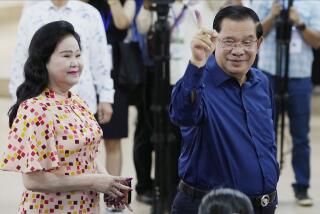Cambodian Factions Fail to Agree on Peace Terms
- Share via
JAKARTA, Indonesia — The four factions in Cambodia’s civil war failed Tuesday to produce an agreement on the composition of a new government or the terms for continuing a cease-fire.
Indonesia, which along with France co-chaired the three days of negotiations here, expressed disappointment at the failure to achieve an agreement. But Foreign Minister Ali Alatas nonetheless maintained that progress was made in narrowing the differences among the four parties.
Khieu Samphan, vice president and foreign minister of the hard-line Khmer Rouge guerrilla group, hinted ominously that his supporters would renew the fighting, which was suspended May 1, in the absence of an agreement.
“Our forces and our people have suffered a lot from the start of the so-called truce until today because Vietnam and the Phnom Penh side have violated the truce,” he said.
The Khmer Rouge had vowed to resume the civil war today if no agreement could be reached.
The Phnom Penh government represented by Premier Hun Sen entered the latest round of negotiations appearing like hard-liners with demands for a war-crimes tribunal. But at the end, it was the Khmer Rouge that left the meeting isolated as the group blocking an accord.
The Jakarta talks were called by France and Indonesia in an effort to resolve the remaining differences among the four parties over a proposed comprehensive settlement drawn up by the five permanent members of the U.N. Security Council--the United States, the Soviet Union, France, Britain and China.
Under the U.N. plan, executive authority in Cambodia would be placed in the hands of a Supreme National Council consisting of all four parties. U.N. peacekeeping troops would disarm the four factions, and U.N. administrators would take over the running of the country until elections are held.
On Sunday, Hun Sen and deposed Prince Norodom Sihanouk, leader of one of the guerrilla factions and of the opposition triumvirate, finally reached agreement on the composition of the council. Instead of the previously envisaged 12 members, the council would have 14, with Sihanouk appointed chairman and Hun Sen a vice chairman.
The Phnom Penh government and the two non-Communist factions accepted the compromise, but the Khmer Rouge failed to agree because Phnom Penh refused to accept the U.N. peace proposals in their entirety.
Hun Sen has refused to agree to the disarming of the four parties on the grounds that the Khmer Rouge could seize power with arms hidden in the jungle.
The Khmer Rouge said it accepted the May 1 cease-fire to get the talks resumed in Jakarta. While Khieu Samphan did not say directly whether his group would continue fighting, he said in response to a question that he hopes that Phnom Penh will accept U.N. supervision.
“It is crystal clear that it is not the (resistance) who do not want peace,” Khieu Samphan said. “It is Vietnam and its Phnom Penh regime who do not want peace by opposing these famous documents.”
Western diplomats and analysts said the apparent breakdown of the talks left no clear path for the negotiations to resume. One called the meeting “a dialogue of the deaf.”
Several European diplomats have argued that France now may be forced to return the issue to the Security Council for further negotiations, contending that talks on the local level hold no prospect for a settlement.
BACKGROUND (Southland Edition, A6)
Cambodia, a French protectorate since 1863, became independent in 1953. In 1970, with the Vietnam War raging, a U.S.-backed government deposed Prince Norodom Sihanouk. The country became the Khmer Republic, heavily reliant on U.S. economic and military aid. But Communists of the Khmer Rouge waged war against the government and, in 1975, seized control. During its nearly four-year reign, the Khmer Rouge tried to radically reorganize the country, depopulating cities and forcing city dwellers to work in the country; an estimated 1 million people died in the upheaval. Vietnam invaded Cambodia in late 1978, ousting the Khmer Rouge and installing the present Communist regime. The Khmer Rouge fled to Thailand and joined two non-Communist factions in a resistance coalition with Sihanouk as its leader. In the past decade, the coalition has waged guerrilla warfare amid fitful attempts at bringing peace to Cambodia.
More to Read
Sign up for Essential California
The most important California stories and recommendations in your inbox every morning.
You may occasionally receive promotional content from the Los Angeles Times.













